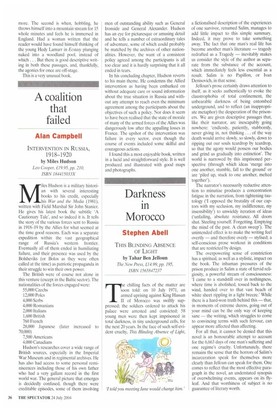A coalition that failed
Alan Campbell
INTERVENTION IN RUSSIA,
1918-1920
by Miles Hudson Leo Cooper, £19.95, pp. 210, ISBN 184415033X miles Hudson is a military historian with several interesting books to his credit, especially his War and the Media (1981), written with Field Marshal Sir John Stanier. He gives his latest book the subtitle 'A Cautionary Tale', and so indeed it is. It tells the story of the various forces sent to Russia in 1918-19 by the Allies for what seemed at the time good reasons. Each was a separate expedition within the vast geographical range of Russia's western frontier. Eventually all of them ended in humiliating failure, and their presence was used by the Bolsheviks (or Bolos as they were often called at the time) as patriotic propaganda in their struggle to win their own power. The British were of course not alone in this venture (except in the Baltic sector). The nationalities of the forces engaged were:
55,000 Czechs 12,000 Poles 4,000 Serbs 4,000 Romanians 2,000 Italians 1,600 British 760 French 28,000 Japanese (later increased to 70,000) 7,500 Americans 4,000 Canadians
Hudson's researches cover a wide range of British sources, especially in the Imperial War Museum and in regimental archives. He has also had access to some personal reminiscences including those of his own father who had a very gallant record in the first world war. The general picture that emerges is decidedly confused, though there were creditable episodes, some of them involving men of outstanding ability such as General Ironside and General Alexander. Hudson has an eye for picturesque or amusing detail and he tells a number of extraordinary tales of adventure, some of which could probably be matched by the archives of other nationalities. However, the want of a consistent policy agreed among the participants is all too clear and it is hardly surprising that it all ended in tears. In his concluding chapter, Hudson reverts to his main theme. He condemns the Allied intervention as having been embarked on without adequate care or sound information about the true situation in Russia and without any attempt to reach even the minimum agreement among the participants about the objectives of such a policy. Nor does it seem to have been realised that the state of morale of many of the armed forces of the Allies was dangerously low after the appalling losses in France. The upshot of the intervention was failure in every sector, even though the course of events included some skilful and courageous actions. I found this a most enjoyable book, written in a lucid and straightforward style. It is well produced and illustrated with good maps and photographs.


























































 Previous page
Previous page